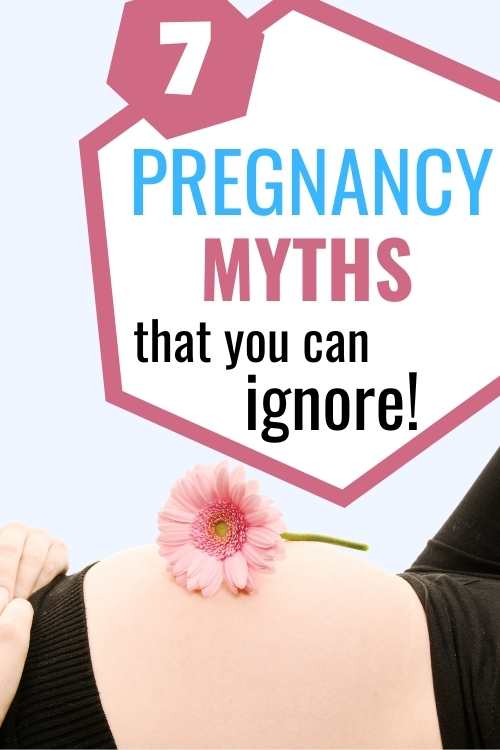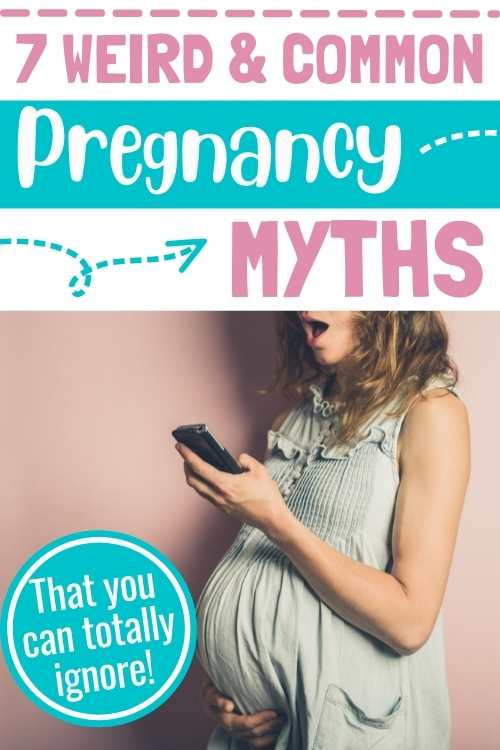The joys of expecting a child are undeniable, for pregnancy is a life-altering event. Conversely, it can also cause a great deal of physical and mental stress to the soon-to-be-mother as it’s every parent’s concern that all aspects of the pregnancy go as smoothly as possible.
During such times, it’s not uncommon to fall prey to half-truths, myths and pseudoscience as expectant mothers scramble to get more information regarding their pregnancy. However, dispelling these pregnancy myths might probably be the best idea to put the minds of expectant parents at ease.
Related: 8 Tips for Coping with Anxiety during Pregnancy
So here are 7 widespread pregnancy myths that we all believed at some point.

Pregnancy Myths
1) Pregnant Women have to Eat for Two
Sounds logical, doesn’t it? After all, there is another person (or persons!) inside you, so you should drastically increase your nourishment so that they are well fed.
Not to mention that a constant appetite is also one of the weird early pregnancy symptoms that many women experience. This approach, however, is quite dangerous in the long run as it negatively affects the health of the mother and the child.
Realistically speaking, an unborn child gets all the nutrients they need from you during the first six months of your pregnancy. Only during the last trimester should you consider increasing your caloric intake, that too by a very nominal amount, like say 200 calories. This is also highly variable depending on your health condition before conception.
If you were already above the healthy weight range, then this too might not be required. In case you do end up overeating, it can adversely affect your health and can also cause obesity-related problems in your child, as pregnancy cravings often lead to the consumption of empty calories in many cases.
Alternatively, when you do increase your caloric intake, focus more on whole foods such as nuts, seeds, milk and other healthy alternatives. These will make you feel good about your body and will also help boost the health of the unborn child. It is best to consult your obstetrician regarding increased calorie intake rather than believing mere hearsay.
Related:
- 45 Strange Early Pregnancy Symptoms (with Stories from Real Moms)
- 30 Pregnancy Cravings Quotes (Hilarious!)
- 5 Tips on How to Feel Attractive while Pregnant
2) Your Heartbeat, Appetite, or Morning Sickness can Predict a Baby’s Gender
This pregnancy myth is quite prevalent and can also be a fun thought experiment in many cases. However, it should never be taken as fact. The myth in question covers different outlandish ideas that can apparently predict the sex of the unborn baby with accuracy.
For example, if the child’s heartbeat is over 140 bpm, then it’s a girl and if it’s lower, then it’s a boy. Or perhaps if you have a large appetite then it must be a boy. Similarly, if you have a pregnancy line (linea nigra) that runs up to your belly button, then then the sex of the unborn child has to be female.
In the modern world of science and technology, it’s surprising to see the prevalence of these dubious myths, and they shouldn’t be taken seriously.
Realistically, your obstetrician can tell you the sex of your unborn child through an ultrasound or a gender test using a non-invasive prenatal testing method. By simply taking a sample of your blood, the presence of cell-free fetal DNA can be analyzed, and the chromosomal makeup of your child can be detected with extreme accuracy, thereby determining the sex.
While this blood test can be done even at ten weeks, an ultrasound might yield accurate results only during weeks 16 to 20, when the sex organs of the child can be clearly differentiated. (Read what’s involved in an earlier 10 week ultrasound scan or later at the 37 week ultrasound scan.)
Related:
- 7 Baby Girl Symptoms during Early Pregnancy (from 1st Trimester!)
- 7 Baby Boy Symptoms during Early Pregnancy (From 1st Trimester!)
- What’s that Pregnancy Line on Stomach? Linea Nigra Explained!

3) Expectant Mothers Can’t Exercise While Pregnant
This one has been dispelled time and time again, however, it still manages to stick around popular culture. While there may be a very small degree of truth to this myth, it definitely doesn’t warrant the level of fear or paranoia that people have surrounding this topic.
If a woman was physically active before conception, then there’s no reason to not continue the activity as the pregnancy progresses. Of course, if it is an advanced or extreme form of physical activity, then it is best to scale down the intensity. But that being said, pregnant ladies can engage in a whole host of physical activities such as yoga, cycling, swimming, jogging and so much more.
The idea here is to get at least 30 minutes of exercise for 5 days a week to maintain a healthy weight and body for the child. For women who were sedentary before pregnancy, it is even more important to engage in physical activity if they want to avoid significant weight gain and mobility issues during the later trimesters.
For those who are beginners in the realm of fitness, even low impact exercises like walking can go a long way in maintaining optimal health for themselves and their little ones.
Related: Best Pregnancy & Antenatal Exercises safe for all Trimesters (and for easier labor!)
4) Pregnant Women Should Avoid Eating Sweets
This myth draws from the fact that many pregnant women get strange food cravings as their hormones and blood sugar levels fluctuate constantly. The image of an expectant mother craving sugary sweets and drinks is as old as time, and it’s believed by many that it’s not good to eat sweets during pregnancy.
Not only is this untrue, but it might actually be beneficial for pregnant women to consume certain forms of sweets. Several studies over the past years have showcased that chocolate (in moderation!) is one sweet that women should have during pregnancy. In fact, one study reached an incredible conclusion: pregnant ladies who consumed chocolate every day had happier and less fearful children during infancy.
Another study found a direct correlation between eating chocolate and a reduction in blood pressure. Apparently, consuming five servings of chocolate a week can reduce the emergency of preeclampsia by almost 40 per cent. Preeclampsia is a dangerous blood pressure condition that often affects women during the third trimester and can damage important organs like the liver and kidneys if left unchecked.
Thus, don’t hesitate to reach out for the slab of chocolate if you are pregnant, for its health benefits are undeniable.
And if you are feeling like having a laugh about all these weird and funny pregnancy cravings, then check out these hilarious quotes, perfect to share on social media!
5) Expectant Mother’s Mood Swings Affect the Baby in a Negative Way
A dangerous myth propagated to this day, it is believed by many that a mother’s mood can positively or negatively affect the health of the baby. Fortunately, it is nothing more than wishful thinking and the mood of the mother has little to no effect on the unborn child.
This myth is dangerous because it puts undue mental pressure on expectant mothers to stay in a good mood while it is already taking a physical toll on them. In fact, everyone knows it’s impossible to stay happy, positive and upbeat all the time and it’s a natural tendency to feel different emotions.
Additionally, pregnant women are going through major hormonal changes in their bodies, which can affect their moods even further. Hence, it’s not uncommon for women to go through some emotional changes, considering the drastic chemical and physical changes that happen in their bodies. Thus, this is a myth that needs to be busted for good.
However, conditions like depression and anxiety are much more severe and concerning than mood swings, so if you feel strong symptoms related to these mental conditions, then it’s best to contact your trusted obstetrician who can guide you further in this matter.

6) Pregnant Women Should Stay Away from Seafood During Pregnancy
Another myth that has been openly propagated with respect to pregnancy is the consumption of seafood. Apparently, it’s believed that eating too much seafood can cause skin rash and other skin-related problems for the baby after birth.
There is absolutely no truth or fact to back up this claim, and in fact, it seems that the opposite might be true. Seafood is extremely beneficial for the mental development of your unborn child. Studies have shown that the presence of omega-3 fatty acids in certain types of seafood can help boost the IQ of the unborn child. Moreover, women who consume at least 0.75 lbs of fish or other types of seafood a week during pregnancy were shown to have children with better verbal, social and motor skills.
Thus, pregnant women are actually encouraged to consume more seafood in order to deliver healthier children. The only caveat with seafood consumption is the presence of mercury in many varieties of fish, which we all know is quite detrimental to human health, especially for unborn children.
Fortunately, high mercury concentrations are found in only a few fishes and shellfish and can be easily avoided with some simple research. Plus, the consumption of wild game or wild-caught fish really mitigates the risk of mercury consumption and these varieties can also be found in many local stores and supermarkets across the world.
7) Creams can Prevent Stretch Marks
While this is a myth many of us wish were true, it unfortunately isn’t the case. The emergence of stretch marks depends on a variety of factors, one of the most important being genetic predisposition. So if your mother had stretch marks after birth, chances are you too would have it. However, they can be reduced to a certain degree by the application of moisturizers.
There are many special creams in the market that claim to remove stretch marks after they appear, promising to bring back your supple skin in a matter of a few weeks. In terms of stretch mark prevention, the only logical course of action is applying a moisturizer.
Regularly moisturizing your skin up to three times a day during pregnancy can reduce the prevalence of stretch marks, even if it can’t prevent it completely. However, make sure that you are using a product that is free of toxins to avoid further complications. Natural products like shea butter and cocoa butter are thought to be quite effective, so consider adding them to your routine.
For optimal results, however, it’s best to consult your doctor who can suggest the best skincare routine for you depending on the condition of your skin.
Conclusion
This concludes the long list of pregnancy-related myths that are still a cause of stress and concern for countless women. If you believed in one or more of these above myths, then hopefully you have learnt something from here and perhaps some of your concerns can be laid to rest.
Of course, this list of myths is by no means exhaustive, and there might be a lot of old and new misconceptions that might still be circulating around the internet today. However, the main aim here is to arm pregnant women with some scientific knowledge so they can tackle these myths head-on and take a more rational approach when confronted with such dubious ‘facts’ in the future.
For more information and tips on how to survive pregnancy, make sure to also have a look at these articles!
- How to Use a Pregnancy Pillow for Back Pain
- 11 Best Pregnancy Planners (incl. FREE & Printable!)
- Pregnancy Survival Kit (30+ Essentials for Mom & Dad)
- 20+ Fun & Creative Things to do while Pregnant
- 20+ Remedies for Heartburn during Pregnancy (and Tips on how to prevent it)
- Chiropractic Care During Pregnancy (What it is & Benefits)
About the Author
Cinu has a wide experience of delivering content on baby and pregnancy, law, health, finance, real estate and technical fields. Follow the latest work here.
Twitter: https://twitter.com/cinu_joseph
Did you find it useful? Pint it!


